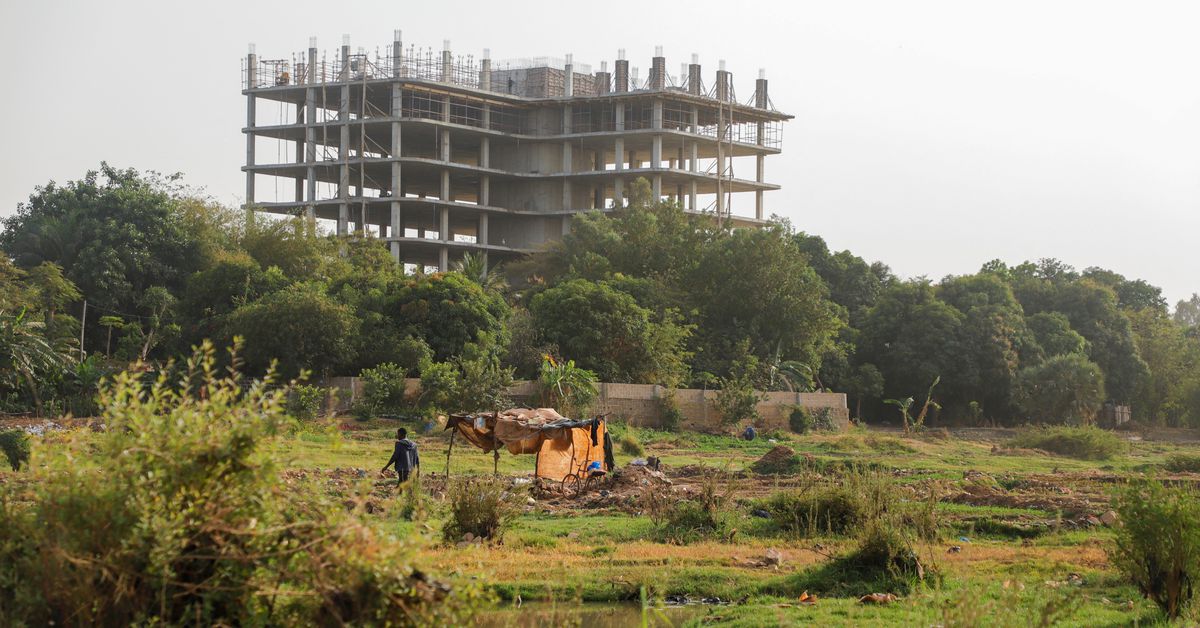Mali’s workers feel the squeeze as sanctions take hold

A view of a building under construction along the Niger river, in Bamako, Mali February 19, 2022. REUTERS/Paul Lorgerie
Summary Economy under strain as Mali defaults on debt
Sanctions lead to mass redundancies, loss of business
Ordinary workers feeling the squeeze
BAMAKO, Feb 21 (Reuters) – Mohamed Cisse used to employ hundreds of workers in Mali’s capital Bamako before economic sanctions last month shut borders and cut the lifeblood of his construction business.
Cement is scarce. Its key ingredient, clinker, comes from neighbouring Senegal, from which all but essential goods are blocked. Cisse has been forced to shut three of his four building sites.
The Economic Community of West African States (ECOWAS) meant to send a powerful message to Mali’s military leaders when it imposed the sanctions after the junta delayed plans to hold elections in February following two coups.
Register now for FREE unlimited access to Reuters.com Register
But workers, many of whom have so far supported the junta for ousting unpopular President Ibrahim Boubacar Keita in 2020, are worried about the outsized impact on ordinary citizens in one of the world’s poorest countries.
Hundreds are being laid off; goods for import are stuck in mammoth traffic jams at border crossings; cotton and gold, major economic drivers, cannot reach regional buyers. read more
How successful the sanctions are in forcing Mali’s leaders to hold elections sooner, or if they reduce support for the junta, could influence how ECOWAS seeks to punish other coup leaders in Guinea and Burkina Faso who have also snatched power over the past year.
“We had a lot of hope when we saw these well-trained, well-structured soldiers. But the situation of this embargo, I would say that it is … 70% the fault of the government, which presented an imprecise (election) timetable,” Cisse said.
The interim government set up by the junta did not respond to requests for comment. It had previously said the sanctions were “disproportionate, inhumane, illegitimate and illegal” and will have severe consequences on the population. read more
ECOWAS says it is imposing the sanctions because Mali’s leaders said they would delay elections until December 2025, nearly four years later than they originally agreed.
TIGHTENING NOOSE
Malians are accustomed to hardship. A decade-old Islamist insurgency has taken over parts of the north and centre, killing thousands. The COVID-19 pandemic contributed to a rise in the cost of fuel and other goods.
But now the economy is under severe strain. Mali has defaulted on 54 billion CFA francs ($93 million) in interest and principal payments since January, data from the West Africa monetary union’s debt agency Umoa-Titres shows.
The government says it is unable to meet its obligations because the sanctions have cut it off from regional financial markets.
“Closing landlocked Mali’s borders, in a country that depends entirely on its coastal neighbours for trade, is nothing short of catastrophic,” said Eric Humphery-Smith, an analyst at risk consultancy Verisk Maplecroft.
The authorities need tax income to pay about $120 million in monthly government wages, said Modibo Mao Makalou, an economist and former adviser to the ousted president Keita. But revenues, including from customs duties and income taxes, are under threat, he said.
Remittances from the region, key to the economy, are also being blocked as wire transfers and bank transfers fail to go through.
“I think (the government) can last 2-3 months maximum, but the noose must be loosened,” Makalou said, referring to the funds left to be able to pay wages and meet other outgoings.
While the impact has yet to be shown in hard economic data, Malians are struggling.
Issiaka Mahmoud Bah, managing director of Bamako-based recruitment firm Golden Resources Management, used to receive resumes from about 25 job applicants per day. He now gets up to 100. Meanwhile, the number of employers seeking workers has plummeted, he said.
Revenues for Sonef, a transport company that buses people from Mali across West Africa, have dropped 80% in recent weeks, said company manager Mamadou Traore. Its customers, including people who transport dyed fabrics to Ivory Coast or bring in fish from Senegal, cannot travel, he said.
“We have had to close several stopovers and put dozens of agents on technical unemployment,” he said.
($1 = 582.7500 CFA francs)
(This story corrected paragraph 14 to show govt wage figure is monthly, not yearly)
Register now for FREE unlimited access to Reuters.com Register
Writing by Edward McAllister Editing by Bate Felix and Alison Williams
Our Standards: The Thomson Reuters Trust Principles.






